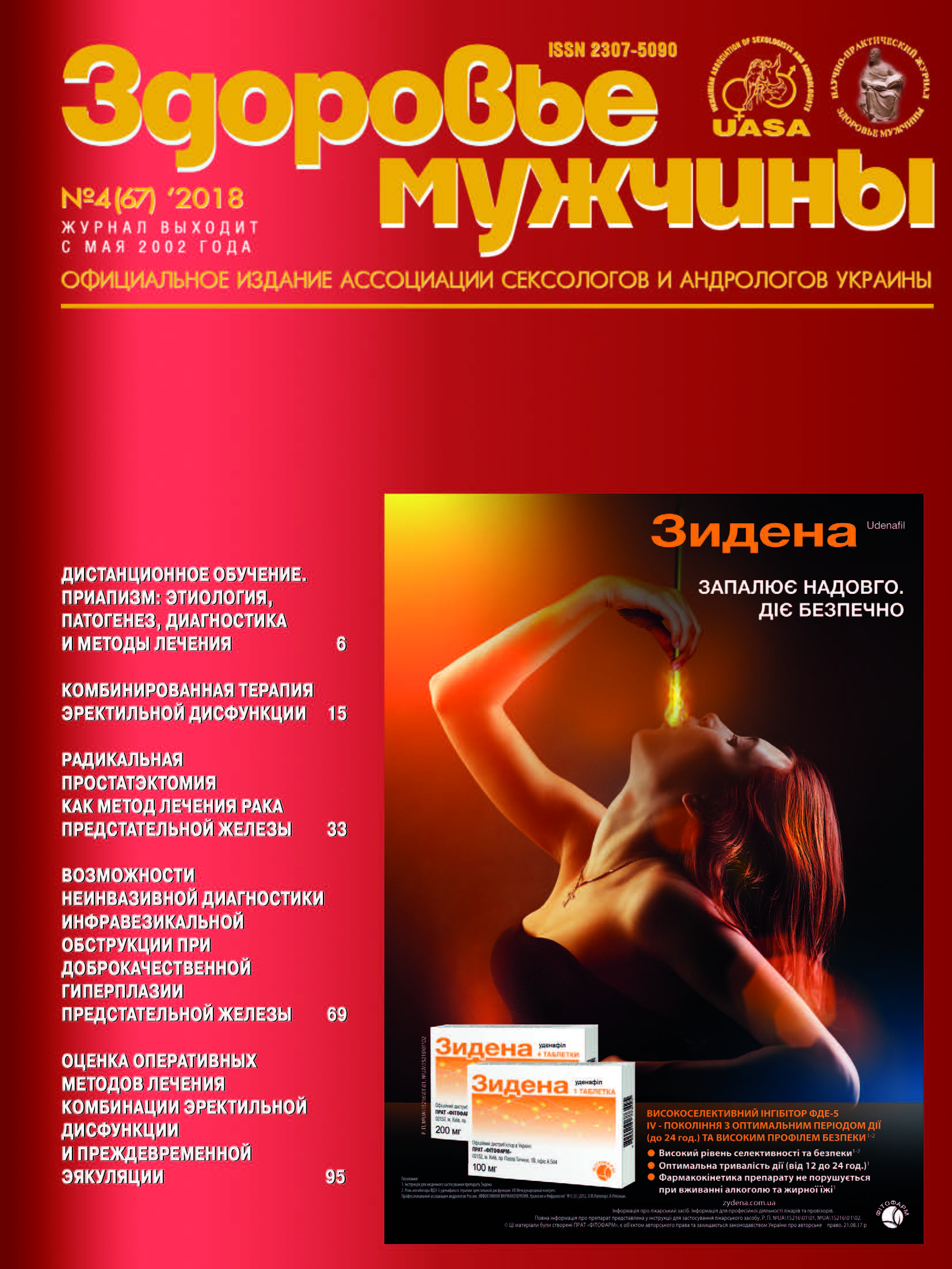Peculiarities of Hystochemical Glutamatedehydrogenase Changes in Artificial Urinary Bladder in Dynamics (Experimental Study)
##plugins.themes.bootstrap3.article.main##
Abstract
The gold standard for the treatment of muscle-invasive bladder cancer with the best indicators of the patient’s quality of life in the postoperative period is radical cystectomy with ileocystoplasty.
The objective: is the investigation of the hystochemically revealed activity of glutamate dehydrogenase in the wall of artificial bladder in experimental animals.
Materials and methods. Experimental studies were performed on 18 female mini-pigs aged 4–5 months and a mass of 8–10 kg. Modeling of the artificial bladder was performed by cystectomy followed by ileocystoplasty. Control studies of glutamate dehydrogenase were performed at 3, 6 and 12 months after the operational simulation.
Results. Hystoenzymological studies of the ileum wall at different stages of the study after the experimental modeling of neobladder did not reveal statistically significant changes in the activity of GDH in the epithelial and submucosa layers compared to healthy animals.
Conclusion. The activity of GDG in the muscular layer of the neocyst after 3 months was significantly increased, with a subsequent tendency to increase. The hypertrophy of myocytes changes the transport capabilities of the neocyst system and leads to a shift in the emphasis of substrata provision towards intermediate metabolites. The insufficient general support contributes to the preservation of life-support processes at a relatively low level.##plugins.themes.bootstrap3.article.details##

This work is licensed under a Creative Commons Attribution 4.0 International License.
Authors retain the copyright and grant the journal the first publication of original scientific articles under the Creative Commons Attribution 4.0 International License, which allows others to distribute work with acknowledgment of authorship and first publication in this journal.
References
Wong MC, Fung FD, Leung C, Cheung WW, Goggins WB, Ng CF. The global epidemiology of bladder cancer: a joinpoint regression analysis of its incidence and mortality trends and projection. Sci Rep. 2018 Jan 18;8(1):1129. https://doi.org/10.1038/s41598-018-19199-z
Antoni S, Ferlay J, Soerjomataram I, Znaor A, Jemal A, Bray F. Bladder cancer incidence and mortality: A global overview and recent trends. Eur Urol 2017 Jan; 71(1): 96–108. https://doi.org/10.1016/j.eururo.2016.06.010
Smith N. D. et al. Bladder cancer mortality in the United States: a geographic and temporal analysis of socioeconomic and environmental factors. J Urol. 2016 Feb;195(2):290–6. https://doi.org/10.1016/j.juro.2015.07.091
Niyati Lobo, Ramesh Thurairaja, Rajesh Nair, Prokar Dasgupta, Muhammad Shamim Khan. Robot-assisted radical cystectomy with intracorporeal urinary diversion – The new ‘gold standard’? Evidence from a systematic review. Arab Journal of Urology. 2018 Sep;16(3):307–13. https://dx.doi.org/10.1016%2Fj.aju.2018.01.006
Wei Shen Tan, Benjamin W. Lamb, John D. Kelly. Complications of Radical Cystectomy and Orthotopic Reconstruction. Adv Urol. 2015; 2015: 323157. http://dx.doi.org/10.1155/2015/323157
Leonardo L. Monteiro, Wassim Kassouf. Radical Cystectomy is the best choice for most patients with muscle-invasive bladder cancer? Opinion: Yes. Int Braz J Urol. 2017 Mar-Apr; 43(2):184–7. https://doi.org/10.1590/S1677-5538.IBJU.2017.02.03
Yong Seong Lee, Ha Bum Jung, Don Kyoung Choi, Sung Tae Cho, Ki Kyung-Kim, Young Goo Lee. Functional Assessment of the Hautmann Ileal Neobladder with Chimney Modification Using Uroflowmetry and a Questionnaire. BioMed Research International Volume 2016. http://dx.doi.org/10.1155/2016/8209589
Parenti A, Aragona F et al. Abnormal Patterns of Mucin Secretion in Ileal Neobladder Mucosa: Evidence of Preneoplastic Lesion? Eur Urol. 1999;35:98–101. https://doi.org/10.1159/000019826





